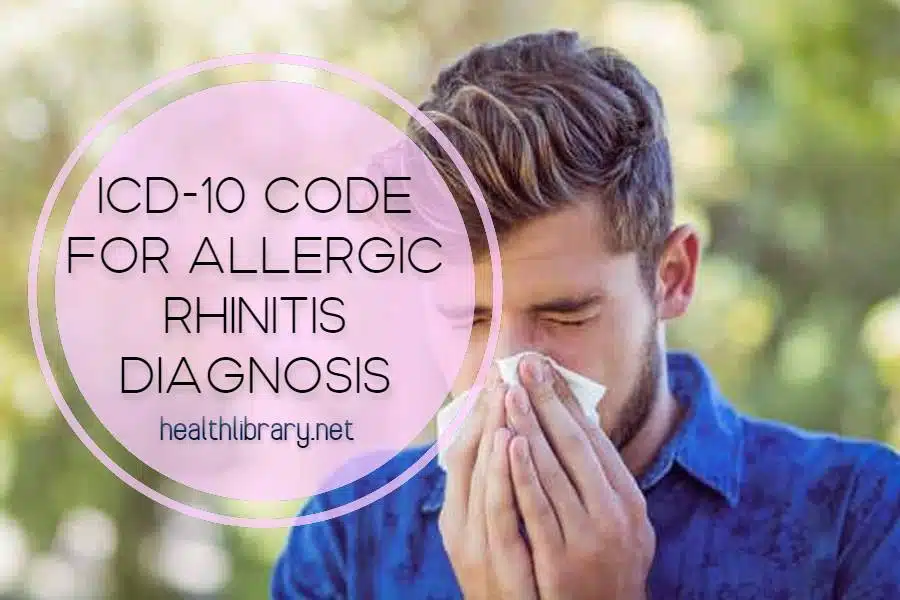Allergic rhinitis is a common illness that causes nasal congestion, sneezing, and other allergic-like symptoms. Healthcare practitioners utilize ICD-10 codes to diagnose illnesses such as allergic rhinitis. This tutorial explains the allergic rhinitis code and what to do if you need to use it.

Understand the Relevant ICD-10 Classification System
The International Classification of Diseases (ICD-10) is the tenth version of the World Health Organization’s system for standardizing medical language, diagnoses, and procedures.
Allergic rhinitis is classed as J30.9 in the chapter “Diseases of the Respiratory System” in this classification system.
Make sure you’re using the proper code before putting it into your records, as erroneous codes might cause payment delays or put providers at risk for penalties.
Read: Alcohol-Related Liver Disease: Symptoms, Diagnosis & Treatment
Locate the Correct Diagnostic Code for Allergic rhinitis
Providers must submit the right diagnostic code in their paperwork to appropriately diagnose a patient with allergic rhinitis and get the requisite payment from insurance. J30.9 is the ICD-10 code for Allergic Rhinitis.
This code should be used regardless of the reason or kind of allergic rhinitis found. It’s worth noting that this is an exact match code, which means no further information or modifiers are required to assign it.
Utilize Clinical Documentation to Support Diagnosis Coding
Appropriate and consistent coding is critical for accurate compensation of a provider’s services, particularly with more complicated diagnoses such as allergic rhinitis.
That is why it is critical for physicians to use clinical documentation to support diagnostic coding. Sneezing, itching, a runny nose, or congestion are clinical indications of allergic rhinitis.
Mucosal edema or discoloration in the patient’s ear canal, nose, or throat should also be noted in order to thoroughly diagnose and categorize allergic rhinitis.
Verify Appropriate Use of the ICD-10 Code for Allergic Rhinitis Diagnosis with Medical Staff and Auditors
Once the accurate ICD-10 code for Allergic Rhinitis is determined based on the documentation, it is critical to confirm its use with medical personnel and outside auditors.
Any anomalies will be highlighted by auditors during a reimbursement assessment and may have a significant impact on reimbursement rates.
To minimize complications, ensure that the entire healthcare team is on the same page and uses the same coding style when diagnosing allergic rhinitis.
Monitor Compliance with Billing Regulations Regarding ICD-10 Codes through Insurance Audits and Monitoring Systems
It’s also critical to keep track of any billing requirements linked to ICD-10 codes. Prior to processing claims and payment requests, insurance companies may conduct routine audits and evaluate evidence to ensure an allergy or disease has been appropriately identified.
If a healthcare provider is found to be in violation of these requirements, future payments may be reduced or accreditation may be revoked.
As payment rates are directly affected by the code used, ensure that it is correct and accurately reflects the patient’s sickness or condition.
What’s allergic rhinitis?
Allergic rhinitis is an allergic reaction that produces nasal channel inflammation, resulting in symptoms including sneezing, runny or stuffy nose, itching, and nasal congestion.
What causes allergic rhinitis?
Allergic rhinitis is caused by an allergic response to chemicals in the air, such as:
- pollen (hay fever)
- dander mites
- fungi spores
- dander from pets (skin cells or hair)
- certain foods
- insects
- medication
The immune system misidentifies these compounds as dangerous and produces histamine, resulting in inflammation and allergic rhinitis symptoms.
What is allergic rhinitis symptoms?
The symptoms of allergic rhinitis include:
- Sneezing
- a stuffy or runny nose
- Eyes, nose, and throat itch
- Eyes that are wet
- Congestion in the nose
- Coughing
- Headache
- Fatigue
- Reduced ability to smell or taste
How long does allergic rhinitis last?
The length of allergic rhinitis varies based on the kind of allergy (seasonal or perpetual) and its severity.
Seasonal allergic rhinitis (hay fever) occurs at specific periods of the year, such as spring or summer, and can remain as long as the allergen is present in the environment.
Perennial allergic rhinitis, on the other hand, can persist all year and can remain indefinitely if the underlying cause is not discovered and treated.
In certain circumstances, allergic rhinitis symptoms can be effectively treated and prevented from persisting too long with adequate therapy.